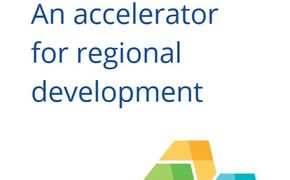On Tuesday 16 June 2020, the Policy Learning Platform hosted a webinar on Public Procurement of Innovation (PPI). Public procurement of innovation (PPI) is a demand-side innovation approach to develop new products or services with the objective to stimulate innovation and deliver new value added services. Public procurement accounts for about 14% of the European Union’s (EU) gross domestic product (GDP) and guides new developments in many of sectors, helps to stimulate future markets, and addresses key societal challenges.
Webinar recording
Webinar agenda overview
Navigate to the discussion topics of interest in the webinar agenda overview below.
00:06:10 The webinar started with an introduction of the Policy Learning Platform research and innovation Thematic Expert, Arnault Morisson, joined by Policy Learning Platform Thematic Expert Marc Pattinson.
00:12:41 Presentation by Diego Moñux from Science Innovation Link on how to incorporate PPI in regional S3
00:29:00 Q&A: What are the barriers that might cause the policy not to work or to stumble at the last stage of implementation?
00:34:26 Q&A: PPIs are rather complex, do they reach their objective? Are products bougth after PPIs, because it seems to be a complex process, especially for SMEs.
00:36:31 Presentation by Mantas Vilys from Lithuanian Innovation Center on Pre-commercial procurement support scheme
00:52:00 Q&A: How does a challenge process emerge? Who sets that process in motion? Is it a bottom-up approach?
00:54:35 Q&A: Will there be a follow up from the ECF and under which ECF objective can the funding be justified?
00:56:07 Presentation by Iñaki Gutierrez Ibarluzea, Director of Organisational and Managerial Innovation of the Basque Foundation for Health Innovation and Research (BIOEF) on Innovative Public Procurement Office
01:10:21 Q&A: How do you see the COVID-19 crisis affecting the way you support Public Procurement of Innovation (PPI)?
Panel discussion
01:16:47 Q&A: We heard a lot about the health sector. Are there other sectors that are as rich of a field for opportunities and you recommend other regions to look at as a priority for innovative public priority?
01:24:13 Q&A: What are the first steps that regions could think of regarding funding these initiatives starting from zero?
1:30:52 Conclusions from Thematic Experts Arnault Morisson and Marc Pattinson.
Key Learnings
Public Procurement of Innovation (PPI) is an important policy tool to respond to regional and societal challenges and help companies, especially SMEs launch new and innovative products and services. The European Commission has published a comprehensive guidance document that presents the fundamental aspects of Public Procurement of Innovation, why it is important, who has interest in it, and how it can be done. With the COVID-19 crisis, the European Commission has established a new guidance on public procurement giving additional flexibility to public buyers and thus offering regions the opportunity to experiment with this policy tool to respond to the socio-economic challenges, for example those emerging with the COVID-19 crisis and desires to enhance European economic and sanitary sovereignty
From this webinar, we can highlight four insights on how regional policymakers can experiment with Public Procurement of Innovation (PPI) in their regions:
- PPI is a complex policy tool that not only requires public buyers to develop specific know-how and skills but also the political leadership and commitment to engage in a shared regional vision for the future.
- PPI can be used to support the implementation of smart specialisation strategy (S3) objectives as it allows the regional government to become an active player in the innovation process. To do so, public buyers must set clear policy objectives to stimulate innovation and set-up the right governance structure to efficiently engage relevant stakeholders.
- The implementation of PPI policies requires the mobilisation and coordination of a whole host regional actors from the demand and the supply side, including procurement bodies, innovation agencies, cluster and of course regional policy makers to manage the public procurement process.
- The lack of expertise and incentives is one of the most important barriers for the adoption of PPI. Financial incentives must be complemented with advisory and coordination supports to ensure the right uptake of PPI. Additionally, regional policymakers can develop matrices to reduce uncertainties, such as evidence or budget uncertainties, related with the public procurement process and select the most adequate type of public procurement interventions.









